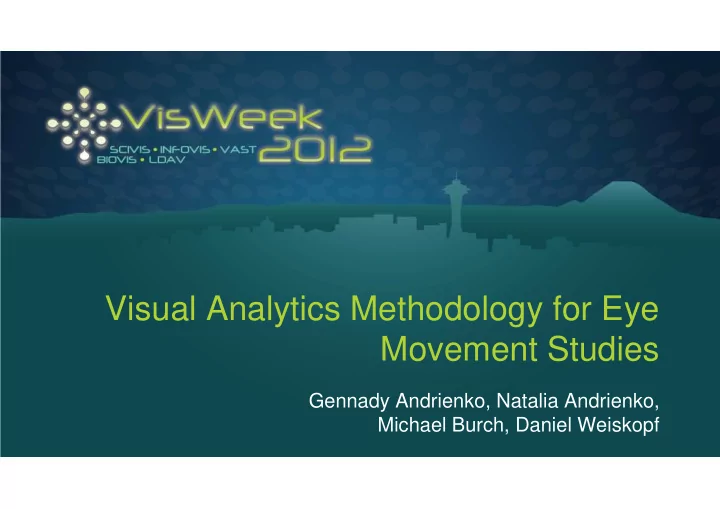

Visual Analytics Methodology for Eye M Movement Studies t St di Gennady Andrienko Natalia Andrienko Gennady Andrienko, Natalia Andrienko, Michael Burch, Daniel Weiskopf
Introduction: eye tracking gains popularity Introduction: eye tracking gains popularity • Eye movement recordings Eye movement recordings are viewed as a window into internal cognitive processes (the “eye-mind” hypothesis) • HCI and visualization researchers hope to h h t understand user’s information processing and information processing and factors affecting the usability of the displays and interfaces
Introduction: eye tracking data Introduction: eye tracking data Task User Eye movements Eye fixations
Introduction: tasks in eye movement analysis Introduction: tasks in eye movement analysis • Attention distribution: • Attention distribution: • Attention movement: • Attention movement: • What areas attract user’s • How much movement? How far? attention? How much attention? How complex is the path? • Does the user find predefined • How is the path related to the Areas Of Interest (AOIs)? How display content? What is the easily? easily? sequence of attending the AOIs? sequence of attending the AOIs? • How does the attention change • What is the search/ exploration/ over time? problem-solving strategy? • What differences exist between • Where are difficulties? users, displays, interfaces? • What differences exist between users displays interfaces? users, displays, interfaces?
Introduction: commonly used techniques Introduction: commonly used techniques Attention movement? Attention distribution
Geo-VA techniques can be helpful Geo VA techniques can be helpful
... also in comparative studies also in comparative studies E.g., 2 different graph layouts
Empirical assessment of Geo-VA methods Empirical assessment of Geo VA methods Evaluation group Technology group gy g p ??? ??? (InfoVis experts) (Geo-VA experts) !?? !??
Eye tracking data used Eye tracking data used • Visual stimuli: 54 tree diagrams • Visual stimuli: 54 tree diagrams • Layouts: traditional, orthogonal, radial • 4 orientations for traditional and orthogonal layouts: top bottom, left right g y p , g • Different number of marked leaf nodes: 3 ( 2), 6 ( 2), 9 ( 2) • 37 participants p p • Task: find the least common ancestor of the marked leaf nodes • See : M. Burch, N. Konevtsova, J. Heinrich, M. Höferlin, D. Weiskopf. Evaluation , , , , p of traditional, orthogonal, and radial tree diagrams by an eye tracking study. IEEE Transactions on Visualization and Computer Graphics , 17(12): 2440-2448, Dec 2011 Dec. 2011
Main result: guidelines Main result: guidelines We thank the reviewers for the good suggestion! We thank the reviewers for the good suggestion!
Example: eye movement patterns over time Example: eye movement patterns over time We can infer types of users’ viewing activities Loss of time! Time intervals clustered according to similarity of the according to similarity of the aggregate eye movements Target!
Who, when, and how often looked at the irrelevant nodes? i l d ? fast fast fast f t slow slow slow slow Trajectories are represented by segmented bars. Horizontal dimension: (relative) time. Horizontal dimension: (relative) time. Segment colours: attribute values. Segments can be interactively filtered.
Comparison of fast and slow users Comparison of fast and slow users 4 user groups 4 user groups according to task completion time p (trajectory duration) Differences to group 3
Performance and returns to previous points Performance and returns to previous points fast slow fast slow
Frequent sequences Frequent sequences Without wildcards
Conclusion Conclusion http://geoanalytics.net/and/papers/vast2012em/ Extracted and Eye movement analysis tasks Eye movement analysis tasks categorized t i d Attention distribution (AOIs) ( ) Attention movement Attention movement Evaluated: 23 Selected: 17 Traditional methods Geo-VA methods for Geo VA methods for for eye tracks for eye tracks movement analysis analysis Limitations analyzed Limitations analyzed Suitability evaluated; Suitability evaluated; procedures defined
Recommend
More recommend